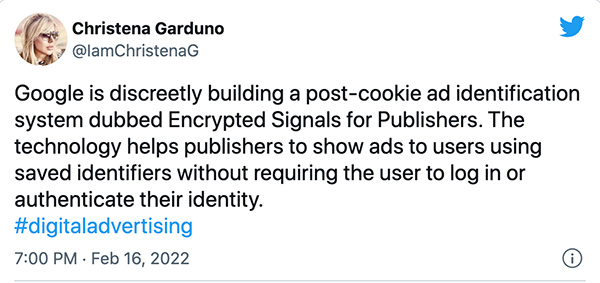| Chrome And Firefox Turn 100 But Is It Good For You? |
 |
| Chrome and Firefox are turning 100. Their browser versions that is. In March, Google will release version 100 of Chrome followed by Mozilla's Firefox in May. The transition could result in potential bugs and compatibility issues for websites that are not prepared to begin reading triple digital User-Agent strings. As a reminder, the User-Agent (UA) string is relied on for targeting and personalization purposes, including for servers to identify the browser. Mozilla and Google have both been heavily testing and attempting to diminish any bugs that could bubble up. Currently, the list of issues is relatively minor, and fingers crossed, they're expected to be manageable. However, there’s an underlying familiarity/complexity like the Y2K bug 22 years ago as well as when browsers reached version 10 and transferred to two-digit user-agent strings just over 12 years ago. Sidebar, can you believe it’s been 22 years since Y2K?! But we digress… |
| This browser shift is likely not on the radar of many pubs, but we think that it kinda needs to be. Mozilla recently released results from their Firefox version 100 testing conducted last year, and although only a small number of sites were impacted, it did impact a few huge names like HBO Go, Bethesda and Yahoo. Some of the bugs discovered included “browser not supported” messages, site rendering issues, parsing failures, 403 errors, and more. And that’s only in reference to the big guys but how will this impact the smaller pubs? The good news: It looks like a lot of crisis management is happening behind the scenes to avoid any major issues popping up once the official release date hits. Solutions include — a temporary freeze at version 99 for both browsers and Mozilla will also attempt to “hot fix” any broken sites pending the level of importance. However, we all know it’s better to prepare for the worst instead of screaming with your hair on fire when anything goes left. While the onus is on Google and Mozilla, they are also hinting at self-help tips to test your site in Chrome and Firefox 100 to flag any potential issues in advance. We know, we know…another item on your watch-out-for list is not ideal but it could save you bounced users and lost revenue in the long run. So get to testing. |
 |
| Rethinking Revenue Diversification | ||
| According to a January 2021 study from the Reuters Institute of Journalism, 76% of 234 publishing industry execs were accelerating their plans for digital transition and revenue diversification in reaction to the impact of Covid-19. On average, publishers were planning to focus on four different revenue streams including: digital subscriptions, advertising, events, and e-commerce, with 74% of those surveyed stating that the best innovation ideas come from audience and data insights. Skip forward a year and confidence in the publishing industry has fallen despite 31% YoY growth in total digital publishing revenue, according to the Q3 2021 Digital Publishers’ Revenue Index released by the Association of Online Publishers. This report also highlights that while 84% of AOP board members reported positive revenue growth, all respondents said they were considering new products "to be a priority" in the next year, up from 55% in Q3 2020. |
||
| For publishers looking to diversify their revenue streams, turning to their data assets to develop new audience-based data products can be a solid option, with technologies such as audience extension allowing them to tap into the value of their first-party data utilizing off-network supply. Maintaining control of these data assets will be critical for securing the longevity of this diversified revenue stream, and for this reason, publishers should look for more privacy-safe audience extension techniques, such as curation. Curation-based audience extension allows publishers to package their data and layer it with third-party supply which best aligns with their brand values. And, because the publisher curates it into deals, curation-based audience extension keeps data visibility where it belongs – with the publisher. The MediaGrid is a next-generation SSP and curation platform that enables publishers to monetize their audience at scale, create data-enriched packages to be activated on any DSP, and do it all without ever giving up control of their data. |
||
|
||
| A Year Later, Publishers Say Keep Your Cookie Crumbles |
 |
| Hearing about the post-cookie era can be a pain in the you know what for publishers, but has the tide turned where we’re no longer waking up in cold sweats? According to Teads’ annual survey of almost 450 publisher executives, it is. More pubs are saying they feel ready for a cookieless world than they did a year ago. According to the results, small, mid, and premium publishers are much more confident and prepared for this next phase. 50% (a 100% year over year increase) view the deprecation of third-party cookies as an “opportunity to differentiate through our first-party data and the quality of our content.” When it comes to education, 30% responded “I have a strong understanding of all the new initiatives in the industry and their benefits/drawbacks” vs just 23% in 2021. There are still plenty of unknowns and uncertainties but that's a leading reason that many of the pubs surveyed are developing a multi-strategy approach. The majority (63%) are leaning on first-party data as the answer, 59% are betting on contextual and 43% are considering adopting a unique ID. Alternatively, a little under 30% are seriously considering Google Privacy Sandbox offerings, like Topics API. |
| Ever since it was first announced, the deprecation of the cookie continues to rent up significant space in our minds. And if these survey results prove true, it’s worth a well-deserved pat on the back. Whether small steps or giant strides have been made publishers planning ahead — in the midst of dipping and dodging new GDPR regulations, Apple iOS privacy updates, and Google’s Privacy Sandbox variations — are deserving of major kudos. As we’ve been saying all along, developing first-party data and contextual strategies will be critical to post-cookie survival, but no pub is alone in formulating the right recipe. Reg walls are one option publishers are toying with but if you’re not as large as the NYT, there can be great hesitation about what this model can do to your audience. Respondents are worried about the impact of reg walls on their traffic (49%), the impact on the user experience (45%), inventory monetization capabilities (33%) tech implementation of logins (31%) and conflicting subscription models (18%). Unlike the industry's unhealthy reliance on third-party cookies, there is no one size fits all solution for when it all finally bids adieu, adios, sayonara. We’ll all be holding on for dear life until it's no longer a moving target. Are you feeling better prepared now than you did a year ago? Or is this survey only reflective of a few, select pubs? |
| Nielsen and The Trade Desk Link up for New International Measurement |
 |
| To say that The Trade Desk is busy is an understatement. After launching Open Path last week, they are now announcing a new partnership with the embattled Nielsen. Nielsen and The Trade Desk have deepened their relationship with a new partnership to help improve open internet measurement in the face of a post-cookie world and ever-evolving privacy regulations. The Trade Desk will now provide demographic data to Nielsen, allowing the dynamic duo to seamlessly connect digital impressions with demographic data across millions of devices. This initiative will kick off in France, Italy, and the United Kingdom. From there, it will expand to Japan, Australia, and Germany on April 1, followed by other Asian and European markets, in addition to Canada and Mexico at a later date. |
| TTD and Nielsen are longstanding buddies, always supportive of one another’s initiatives so it’s not a huge surprise that they’ve joined forces on this effort. As a preferred measurement provider for TTD, Nielsen could take a huge leap back into everyone’s good graces and further away from its accreditation nightmare last year. By integrating TTD’s demographic data, the Nielsen ID System gets a level up in scope, accuracy, and credibility. This could also equip publishers and advertisers with more confidence in precisely assigning which demographic has actually viewed an ad and also act as a solution for audience deduplication. We see your side-eye. While this will serve more as an advantage for Nielsen, the move also keeps the conversation focused on TTD and their recent tech giant moves. Of course, it’s way too early to determine how much power comes from this union but publishers should realize some benefits over time. |
| Around the Water Cooler |
 |
| Maryland Digital Ad Tax Leads to Fisticuffs In a move that surprised virtually no one, big tech came out guns blazing against Maryland's digital advertising tax, which was enacted a year ago. The tax law applies to revenue generated from digital ads shown inside Maryland and is only applicable to companies that generate over $100 million from digital ads. In other words, it targets the triopoly — Google, Meta, and Amazon. The argument: Is this really a law or is it just an unconstitutional attack on big tech? Constitutional challenges abound. Opponents say the law violates the federal Internet Tax Freedom Act, which prohibits discrimination against electronic commerce, as well as other federal laws. What happens in MD could greatly influence other states, like New York, Connecticut, Indiana, Montana, Nebraska, Oregon, and Washington, that all have similar proposals on the table. The Massachusetts legislature is currently looking at five separate digital advertising tax measures. And a couple of them look like they aren't just aimed at big tech. These digital ad taxes could greatly impact online marketplaces in the future. Is Big G Allowing Pubs to Share Some Cookies? Third-party cookies in Chrome may be dying and an Android tracking ban is imminent, but GAM has been expanding some capabilities for publishers to use their data in programmatic ad auctions.  Encrypted Signals for Publishers will enable pubs to use their data to work with ID providers and advertisers. "It’s a first-party cookie ID that a publisher can choose to make cross-device by using something like an email address to link device IDs. Publishers then can share these via OB by using the encrypted signals for publishers product," tweeted Caitlin Fitzharris back in November. But take note, this is happening exclusively through Google's pipes. |
 |
||||||||
|
||||||||
 |
||||||||
|
||||||||
 |
||||||||
|
| @{optoutfooterhtml}@ |








